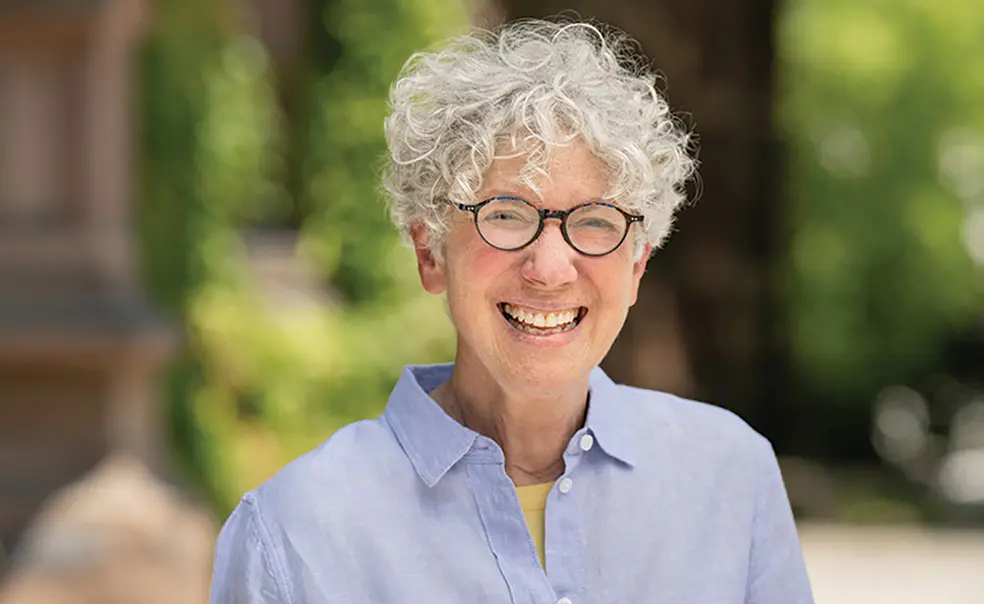After Nearly a Decade as Dean, Jill Dolan Looks Back
COVID and efforts to expand access marked Dolan’s tenure
Princeton dean of the college Jill Dolan is stepping down this June after nearly a decade in the role. Dolan, who joined the faculty in 2008 and is also the Annan Professor of English and a professor of theater, will take a two-year sabbatical before retiring in 2026, according to the University. PAW asked Dolan about standout moments from her time as dean, the road ahead for Princeton, and what she’ll be doing this summer.
In the University’s announcement of your departure, you said you are proudest of increasing the socioeconomic diversity of the undergraduate student body. Why?
It’s been the most dramatic change to Princeton in my nine years as dean. We launched the Emma Bloomberg Center for Access and Opportunity last year, and I think Princeton has really changed [due to] an influx of students who never before imagined themselves as students here. And I think [those students have] changed because of the kinds of opportunities and experiences that being a part of this campus community has been able to afford them.
What’s been your favorite part of the job?
Walking on campus and hearing students say, “Hi, Dean Dolan.” (Laughs) Those are the moments that make me feel like what I’m doing is visible and important enough for them to know or care who I am. Because I haven’t been able to teach in nine years, the moments where I actually get to engage with students have been so important and pleasurable.
What was your biggest challenge?
When I took this role in 2015, none of us anticipated there’d be a global pandemic. At the same time, it was really gratifying to see the campus come together, [and for] so many people [to pull] out all the stops to figure out how we were going to keep delivering a Princeton education. That was the biggest challenge, and the biggest gratification was that we didn’t have to close.
Is there anything you hope to see Princeton achieve in the next few years?
I’m looking forward to seeing the end of all this construction and actually seeing how these buildings change the feel of the geography of campus. I’m looking forward to seeing how the curriculum continues to transform; what will be new minors, majors, [and] departments in five or 10 years?
As you leave, do you have a message for the University community?
I like to say one of the ways I’ve tried to lead is with humor, humility, and humanity, and what I wish for the campus is that we all find ways to continue to be human with one another in a culture that is often more vicious than it is kind. Our political discourse is not a happy one, and it’s always seemed to me that a university like Princeton can be a place where we practice doing things differently and practice engaging one another with respect and kindness and empathy and hope. We have to work together to maintain our own humanity.
Have you given your successor, Michael D. Gordin, a professor of history at Princeton, any advice?
I’ve given him lots of advice. We’ve been talking through priorities, what the current issues are, how the work happens. I’ll be very curious to see how he does the job differently.
How does it feel to be passing the torch?
It feels bittersweet. I love the people who I work with, so I will miss the really stimulating conversations and the problem-solving we do together. I am going to be on sabbatical here for two years, and I’m really eager to take advantage of all the events and opportunities that happen on campus every day that my schedule as dean has precluded.
What else will you be doing on sabbatical?
I did promise myself that I would not formulate projects until I had some time over the summer to really think about what it is I’d like to do, but part of me feels it would be a nice capstone project to write about my time as dean, to think about the issues that have been raised these past 10 years [and to] respond to attacks on higher education.
And I would like to go back to writing in my field. There’s a lot to say about theater and performance in this historical moment, when we’re returning to live events and trying to figure out what that means after two years of real isolation.
What are you most looking forward to?
The thing I’m most looking forward to is also the thing that I have to say freaks me out a little bit, which is having control of my own time. My calendar is quite something to look at. I think it’s going to be really interesting to see on a day-to-day level how I fill my time, and at the same time, it’s a little daunting to suddenly think of having so much time.
You seem like you’re the type of person who’s going to be working until the last hour.
This is true. People keep [asking], “Are you counting the days?” And I keep responding, “I don’t have time because I still have a job.”
Interview conducted and condensed by J.B.












No responses yet